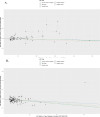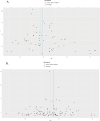Association between type 2 diabetes and gastric cancer in Europeans and East Asians based on two sample Mendelian randomization
- PMID: 40244549
- PMCID: PMC12006575
- DOI: 10.1007/s12672-025-02317-5
Association between type 2 diabetes and gastric cancer in Europeans and East Asians based on two sample Mendelian randomization
Abstract
Background: There are conflicting results and potential methodological flaws of previous observational studies on the association between T2DM and the risk of gastric cancer.This two-sample Mendelian randomization (MR) study aimed to investigate the causal association between type 2 diabetes mellitus (T2DM) and gastric cancer in different ethnic populations.
Methods: Exposure variables were obtained from genome-wide association studies (GWAS) of T2DM in European population (finn-b-E4_DM2; 32,469) and East Asian population (ebi-a-GCST90018706; n = 45,383). Concomitantly, we utilized summary-level genetic data for gastric cancer in Europeans population (ebi-a-GCST90018849; n = 1029) and East Asians population (ebi-a-GCST90018629; n = 7,921) as the outcome measure. Causal associations between T2DM and gastric cancer in the same ethnic groups were primarily determined using the inverse-variance weighted (IVW) method.
Results: A total of 62 and 106 single nucleotide polymorphisms associated with T2DM were selected for in Europeans and East Asians, respectively. The IVW analysis indicated that there was a significant inverse association between T2DM and gastric cancer in Europeans (odds ratio [OR] 0.917; 95% confidence interval [CI] 0.855-0.984) and East Asians (OR 0.881; 95% CI 0.845-0.918). The weighted median and Weighted mode regression models produced similar results. MR-Egger regression analysis suggested the absence of horizontal pleiotropy. The leave-out sensitivity analysis demonstrated that the results were stable.
Conclusion: This MR study revealed that T2DM may be associated with a reduced risk of gastric cancer in European and East Asian population.
Keywords: Gastric cancer; Inverse association; Mendelian randomization; Risk; Type 2 diabetes mellitus.
© 2025. The Author(s).
Conflict of interest statement
Declarations. Ethics approval and consent to participate: Not applicable. Consent for publication: Not applicable. Competing interests: The authors declare no competing interests.
Figures




Similar articles
-
Associations between type 2 diabetes mellitus and chronic liver diseases: evidence from a Mendelian randomization study in Europeans and East Asians.Front Endocrinol (Lausanne). 2024 Mar 1;15:1338465. doi: 10.3389/fendo.2024.1338465. eCollection 2024. Front Endocrinol (Lausanne). 2024. PMID: 38495785 Free PMC article.
-
Causal relationship between type 2 diabetes mellitus and bone mineral density: a Mendelian randomization study in an East Asian population.Osteoporos Int. 2023 Oct;34(10):1719-1727. doi: 10.1007/s00198-023-06807-6. Epub 2023 Jun 12. Osteoporos Int. 2023. PMID: 37306802 Free PMC article.
-
Causal effects of inflammatory bowel disease on risk of type 2 diabetes: a two-sample multivariable Mendelian randomization study.Acta Diabetol. 2024 Jun;61(6):715-724. doi: 10.1007/s00592-024-02254-9. Epub 2024 Mar 1. Acta Diabetol. 2024. PMID: 38427067
-
Causal linkage between type 2 diabetes mellitus and inflammatory bowel disease: an integrated Mendelian randomization study and bioinformatics analysis.Front Endocrinol (Lausanne). 2024 Jan 19;15:1275699. doi: 10.3389/fendo.2024.1275699. eCollection 2024. Front Endocrinol (Lausanne). 2024. PMID: 38313367 Free PMC article.
-
Associations between Type 2 Diabetes Mellitus, Metabolic Traits, and Abdominal Aortic Aneurysm: A Cross-Ethnic Mendelian Randomization Analysis.Ann Vasc Surg. 2025 Jan;110(Pt B):405-413. doi: 10.1016/j.avsg.2024.07.105. Epub 2024 Aug 3. Ann Vasc Surg. 2025. PMID: 39103013
References
Grants and funding
LinkOut - more resources
Full Text Sources
